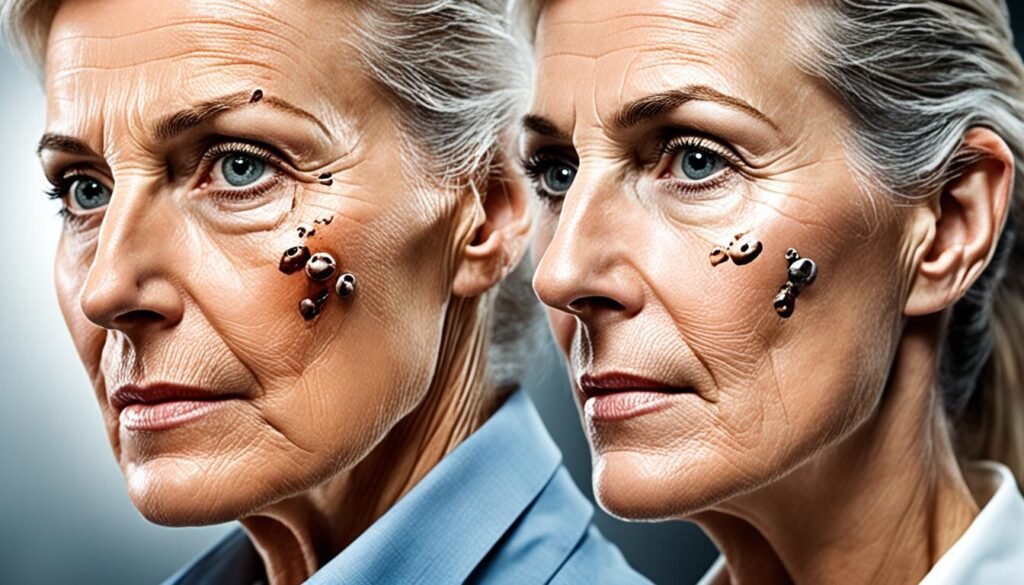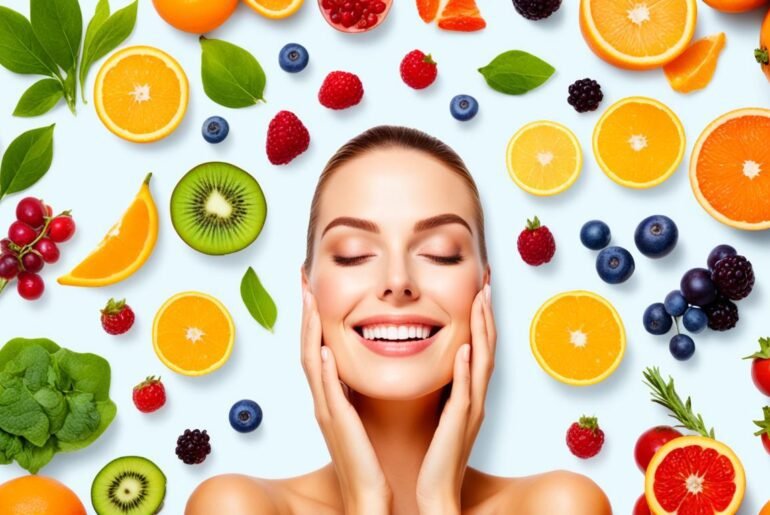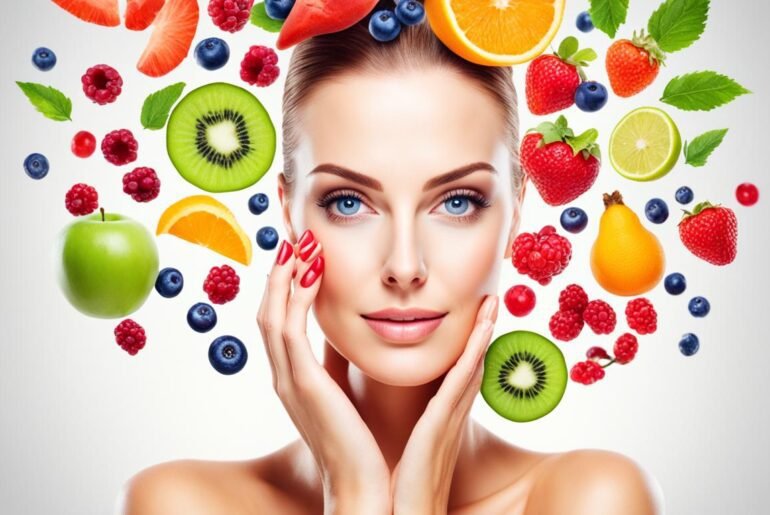Did you know that oxidative stress caused by reactive oxygen species (ROS) accelerates skin aging, leading to wrinkles and pigmentation issues? The good news is that antioxidants have been found to be effective in preventing the signs of photo-induced skin aging.
Key Takeaways:
- Antioxidants play a crucial role in reducing skin aging by neutralizing ROS and protecting the skin from oxidative damage.
- UV radiation is a major contributor to ROS generation in the skin, leading to skin inflammation, oxidative damage, and the breakdown of collagen and elastin.
- Representative antioxidants like vitamin C, vitamin E, and polyphenols have shown positive effects on improving skin health and reducing the signs of aging.
- In addition to antioxidant-rich skincare products, practicing sun protection and maintaining a healthy diet rich in antioxidants can contribute to maintaining a youthful complexion.
- Further research is needed to explore the full potential of antioxidants in skincare and their long-term effects on skin aging.
The Generation and Elimination of Reactive Oxygen Species (ROS)
Reactive oxygen species (ROS) play a significant role in various physiological processes. These highly reactive molecules can either be oxygen molecules with an unpaired electron or oxygen molecules in an excited state. Examples of ROS include superoxide anion radicals, hydroxyl radicals, lipid peroxyl radicals, nitric oxide radicals, and singlet oxygen. ROS are commonly generated through enzymatic reactions and the respiratory chain reaction in cells.
ROS generation is a natural byproduct of cellular metabolism and is essential for normal cellular functions. However, excessive ROS production can lead to oxidative stress, which is characterized by an imbalance between ROS generation and elimination.
The body has evolved several endogenous antioxidant systems to help eliminate ROS and maintain cell health. One such system includes the enzyme superoxide dismutase (SOD), which converts superoxide anion radicals into less harmful molecules. Another important antioxidant enzyme is catalase, which breaks down hydrogen peroxide into water and oxygen. These antioxidant systems work in concert to neutralize ROS and prevent oxidative damage.
Oxidative stress occurs when the production of ROS outweighs the body’s antioxidant defenses. This imbalance can cause damage to DNA, proteins, and lipids, resulting in various health problems and accelerating the aging process. Oxidative stress has been linked to numerous diseases, including cardiovascular disease, neurodegenerative disorders, and cancer.
To give you a better understanding, here is a table summarizing ROS generation mechanisms:
| ROS Type | Mechanism of Generation |
|---|---|
| Superoxide anion radicals | Generated through the respiratory chain reaction in mitochondria |
| Hydroxyl radicals | Formed through the Fenton reaction or reaction between superoxide and hydrogen peroxide |
| Lipid peroxyl radicals | Arise from the oxidation of polyunsaturated fatty acids |
| Nitric oxide radicals | Produced by nitric oxide synthases |
| Singlet oxygen | Generated by the transfer of energy from excited state molecules |
Understanding the generation and elimination of ROS is crucial in developing strategies to counteract oxidative stress and its detrimental effects. By targeting ROS generation pathways and boosting the body’s endogenous antioxidant systems, it may be possible to mitigate oxidative stress and prevent age-related diseases.
The Effects of ROS on the Skin

UV radiation plays a significant role in the generation of reactive oxygen species (ROS) in the skin. When exposed to UVB radiation, an abundance of superoxide anion radicals is produced, while UVA radiation generates singlet oxygen and superoxide anion radicals. These ROS can have detrimental effects on the skin, leading to various signs of aging.
One of the primary consequences of ROS on the skin is inflammation. UV-induced oxidative stress triggers an inflammatory response, resulting in redness, swelling, and overall skin irritation. Additionally, ROS can cause extensive damage to DNA and proteins within the skin cells, impairing their normal functioning.
The breakdown of collagen and elastin is another effect of ROS on the skin. Collagen and elastin are essential proteins that maintain the skin’s structure and elasticity. ROS disrupt the synthesis and organization of these proteins, resulting in the formation of wrinkles and the loss of firmness.
Furthermore, ROS-induced oxidative stress can lead to the overproduction of melanin, resulting in hyperpigmentation and uneven skin tone. This can manifest as dark spots or patches, making the skin appear aged and less radiant.
Overall, excessive and prolonged exposure to ROS generated by UV radiation can accelerate the aging process of the skin. Wrinkles, pigmentation issues, decreased elasticity, and an overall dull and aged appearance are the consequences of photo-induced aging caused by ROS.
“UV-induced oxidative stress triggers an inflammatory response, resulting in redness, swelling, and overall skin irritation.”
To better understand the effects of ROS on the skin, let’s take a look at a table summarizing the main consequences of photo-induced aging:
| Effect of ROS on the Skin | Description |
|---|---|
| Wrinkles | ROS disrupt the synthesis and organization of collagen and elastin, leading to the formation of wrinkles. |
| Pigmentation Issues | ROS-induced oxidative stress can cause overproduction of melanin, resulting in hyperpigmentation and uneven skin tone. |
| Decreased Elasticity | ROS weaken the structure of the skin by breaking down collagen and elastin, leading to decreased elasticity. |
| Dull and Aged Appearance | ROS-induced damage, including inflammation and DNA/protein damage, can make the skin look dull and aged. |
Understanding the effects of ROS on the skin highlights the importance of incorporating antioxidant-rich skincare products and protective measures to minimize the impact of oxidative stress. By neutralizing ROS and reducing inflammation, antioxidants can help slow down the aging process, resulting in a healthier and more youthful complexion.
The Role of Antioxidants in Skin Aging
Antioxidants play a crucial role in preventing skin aging by neutralizing reactive oxygen species (ROS) and protecting the skin from oxidative damage. By scavenging free radicals and reducing inflammation, antioxidants help maintain the health and integrity of the skin, promoting a more youthful appearance.
When exposed to environmental stressors like UV radiation and pollution, the skin experiences oxidative stress, leading to the production of ROS. These ROS can trigger a cascade of damaging reactions that contribute to skin aging, including the breakdown of collagen and elastin, the formation of wrinkles, and the development of pigmentation issues.
To combat the harmful effects of ROS, antioxidant-rich skincare products are highly beneficial. These products provide the skin with additional defense against oxidative damage, helping to slow down the aging process. By including antioxidants in your skincare routine, you can enhance the resilience of your skin and maintain a youthful complexion.
“Antioxidants are essential for protecting the skin from oxidative stress and preventing premature aging. They work by neutralizing free radicals and reducing inflammation, two key factors in the aging process.” – Dr. Emily Davis, Dermatologist
Antioxidants such as vitamin C, vitamin E, and polyphenols have been extensively studied for their anti-aging properties. Vitamin C, also known as ascorbic acid, is a powerful antioxidant that promotes collagen synthesis and helps fade dark spots. Vitamin E, in the form of tocopherols, acts as a free radical scavenger, protecting cell membranes from oxidative damage. Polyphenols, found in green tea and resveratrol, possess anti-inflammatory and antioxidant properties.
By incorporating antioxidant-rich skincare products into your routine and consuming a balanced diet that includes fruits, vegetables, and other sources of antioxidants, you can provide your skin with the necessary tools to fight against oxidative stress and maintain a youthful appearance.
| Antioxidant | Benefits |
|---|---|
| Vitamin C | Promotes collagen synthesis Reduces pigmentation issues |
| Vitamin E | Acts as a free radical scavenger Protects cell membranes |
| Polyphenols | Anti-inflammatory properties Provides antioxidant protection |
Remember, prevention is key when it comes to skin aging. In addition to using antioxidant-rich skincare products, it’s important to practice sun protection by wearing sunscreen and protective clothing when exposed to UV radiation. A healthy diet that includes antioxidant-rich foods can also contribute to maintaining a youthful complexion.
Overall, antioxidants play a vital role in skin aging prevention. By incorporating them into your skincare routine and embracing a healthy lifestyle, you can support your skin’s natural defense system and enjoy a more youthful and radiant complexion.
Representative Antioxidants and Their Effects on the Skin

Various antioxidants have been extensively studied for their beneficial effects on the skin. These representative antioxidants, when incorporated into skincare routines or consumed as part of a balanced diet, can improve skin health and slow down the aging process.
Vitamin C (Ascorbic Acid)
Vitamin C is an essential nutrient that plays a crucial role in collagen synthesis, the protein responsible for maintaining the skin’s structure and elasticity. It also possesses depigmentation properties, making it effective in reducing the appearance of dark spots and discoloration on the skin.
Vitamin E (Tocopherols)
Vitamin E, specifically tocopherols, acts as a potent free radical scavenger, protecting the skin’s cells from oxidative damage. It helps neutralize harmful free radicals and safeguards cell membranes from oxidative stress, promoting overall skin health.
Polyphenols (Resveratrol)
Polyphenols, such as resveratrol, are compounds with strong antioxidant and anti-inflammatory properties. They help reduce inflammation in the skin and provide protection against oxidative stress. Resveratrol, in particular, has been shown to have beneficial effects on the skin’s aging process.
When applied topically or consumed through a balanced diet, these representative antioxidants can effectively combat the effects of oxidative stress, minimize signs of aging, and promote a more youthful-looking complexion.
| Antioxidant | Effects on the Skin |
|---|---|
| Vitamin C (Ascorbic Acid) | Essential for collagen synthesis, depigmentation properties |
| Vitamin E (Tocopherols) | Acts as a free radical scavenger, protects cell membranes |
| Polyphenols (Resveratrol) | Anti-inflammatory, antioxidant properties |
These representative antioxidants demonstrate the diverse range of benefits they offer to the skin. Incorporating skincare products or dietary sources rich in these antioxidants can contribute to improved skin health, reduced signs of aging, and a revitalized complexion.
Preventive Measures for Skin Aging
In addition to using antioxidant-rich skincare products, there are several preventive measures you can take to slow down skin aging and maintain a youthful complexion. By incorporating these practices into your daily routine, you can protect your skin from damage and maintain its health and vitality.
1. Practice Sun Protection
One of the most important preventive measures for skin aging is to protect your skin from harmful UV radiation. When heading outdoors, make sure to apply a broad-spectrum sunscreen with a high SPF and wear protective clothing, such as hats and sunglasses, to shield your skin from the sun’s rays. This helps minimize the production of reactive oxygen species (ROS) and prevents photo-induced skin aging.
2. Maintain a Healthy Diet Rich in Antioxidants
Your diet plays a crucial role in maintaining the health and appearance of your skin. Consuming a variety of antioxidant-rich foods, such as berries, leafy greens, nuts, and seeds, can help neutralize free radicals and reduce oxidative stress. These natural antioxidants provide nourishment to your skin from within, helping to keep it youthful and vibrant.
3. Consider Antioxidant Supplements When Necessary
In some cases, you may need to supplement your diet with antioxidant supplements to ensure an adequate intake of essential antioxidants. Consult with a healthcare professional to determine if antioxidant supplements are suitable for you and to identify the most appropriate ones based on your individual needs.
“Taking preventive measures, such as practicing sun protection and maintaining a healthy diet rich in antioxidants, can significantly contribute to maintaining a youthful complexion and slowing down the aging process.”
By incorporating these preventive measures into your lifestyle, you can improve the overall health and appearance of your skin. Remember that prevention is key when it comes to skin aging, and taking proactive steps today can lead to healthier and more youthful skin in the future.
The Effectiveness of Antioxidants in Skin Aging

Studies have shown that treatment with antioxidants, both topically and orally, can significantly improve the signs of skin aging and enhance the skin’s resistance to oxidative stress. Clinical and basic studies have demonstrated the effectiveness of antioxidants such as ascorbic acid (vitamin C), tocopherols (vitamin E), and polyphenols in preventing and reducing skin aging.
Antioxidants help neutralize reactive oxygen species (ROS) that contribute to skin aging by scavenging free radicals and reducing oxidative damage. These compounds play a crucial role in maintaining skin health, promoting collagen production, and protecting against UV-induced skin damage.
One notable antioxidant, ascorbic acid (vitamin C), is known for its ability to stimulate collagen synthesis, improve skin elasticity, and reduce hyperpigmentation. It also possesses both antioxidant and anti-inflammatory properties that can help counteract the detrimental effects of environmental stressors on the skin.
Tocopherols, another group of antioxidants commonly known as vitamin E, act as potent free radical scavengers and protect cell membranes from oxidative damage. They contribute to skin hydration, inhibit inflammation, and improve the overall texture and appearance of the skin.
“The clinical and basic studies validate the effectiveness of antioxidants in combating skin aging. These compounds have shown promising results in improving skin elasticity, reducing wrinkles, and enhancing overall skin tone and texture.”
Polyphenols, found abundantly in plants, have gained significant attention for their antioxidant and anti-inflammatory properties. Resveratrol, a prominent polyphenol, has shown potential in reducing oxidative stress and inflammation in the skin, leading to improved skin health and a reduction in the visible signs of aging.
Several clinical studies have evaluated the efficacy of antioxidant-rich skincare products in improving skin aging parameters, such as wrinkles, pigmentation, and skin texture. These studies demonstrate the positive impact of antioxidants on skin health and provide scientific evidence supporting their effectiveness.
“Clinical studies have confirmed the positive effects of antioxidant-rich skincare products in improving skin aging parameters, including wrinkles and pigmentation. The evidence suggests that incorporating antioxidants into skincare routines can lead to visible improvements in skin texture and overall appearance.”
Basic research studies have also contributed to our understanding of the underlying mechanisms through which antioxidants protect against skin aging. These studies have identified specific cellular and molecular pathways that are influenced by antioxidants, shedding light on the potential therapeutic applications of these compounds.
To summarize, various clinical and basic studies have demonstrated the effectiveness of antioxidants, including ascorbic acid, tocopherols, and polyphenols, in improving skin aging. By neutralizing free radicals and reducing oxidative damage, antioxidants help maintain skin health and improve the visible signs of aging.
| Antioxidant | Benefits |
|---|---|
| Ascorbic Acid (Vitamin C) | Stimulates collagen synthesis, reduces hyperpigmentation, and protects against environmental stressors |
| Tocopherols (Vitamin E) | Scavenges free radicals, enhances skin hydration, and improves skin texture |
| Polyphenols (e.g., Resveratrol) | Anti-inflammatory properties, reduces oxidative stress, and improves overall skin health |
These findings not only emphasize the importance of incorporating antioxidants into skincare routines but also provide a foundation for further research and development of innovative antioxidant-based skincare products.
The Potential Side Effects of Antioxidants

While antioxidants are generally considered safe, it’s important to be aware of the potential side effects, especially when it comes to certain antioxidant vitamins like vitamin E and vitamin A. The misuse or excessive intake of these vitamins can lead to adverse health effects, emphasizing the importance of maintaining a balanced intake of antioxidants.
Excessive intake of vitamin E: Consuming very high doses of vitamin E from supplements may lead to an increased risk of bleeding, especially in individuals taking blood-thinning medications or with pre-existing bleeding disorders. It’s recommended to consult with a healthcare professional before starting any high-dose vitamin E supplementation.
Excessive intake of vitamin A: Taking too much vitamin A in the form of supplements can be harmful to the body. High doses of vitamin A over an extended period may result in hypervitaminosis A, leading to symptoms such as blurred vision, nausea, dizziness, and even liver damage. It’s crucial to follow the recommended daily intake guidelines and seek guidance from a healthcare provider.
Additionally, it’s worth noting that suboptimal supply of antioxidants can also have implications. Inadequate intake of antioxidant-rich foods or relying solely on supplements without a well-balanced diet may limit the overall benefits of antioxidants. It’s best to strive for a diverse range of antioxidant sources, including fruits, vegetables, nuts, seeds, and whole grains to ensure a comprehensive supply.
“Keeping antioxidants in proper balance is critical for maintaining good health and reaping the maximal benefits they offer to the body. A well-informed approach, including professional guidance if needed, can help achieve the desired balance and minimize any potential risks.”
Conclusion
In conclusion, the impact of antioxidants on skin aging cannot be underestimated. These powerful compounds play a crucial role in protecting the skin from oxidative stress, one of the leading causes of premature aging. By neutralizing harmful free radicals and reducing inflammation, antioxidants help maintain the health and youthful appearance of the skin.
To incorporate antioxidants into your skincare routine, consider using antioxidant-rich products that contain ingredients like vitamin C, vitamin E, and polyphenols. These can help shield your skin from environmental damage and promote a more youthful complexion. Additionally, adopting a balanced diet that includes antioxidant-rich foods such as fruits, vegetables, and nuts can provide your skin with the necessary nutrients to combat aging.
Remember, prevention is key when it comes to skin aging. Alongside using antioxidant-rich skincare products and maintaining a healthy diet, practicing sun protection is essential. UV radiation is a significant contributor to oxidative stress, so make sure to wear sunscreen, protective clothing, and seek shade when necessary.
While the impact of antioxidants on skin aging is evident, further research is still needed to fully understand their long-term effects and optimal usage in skincare. By staying informed and incorporating antioxidants into your skincare routine responsibly, you can help preserve your skin’s health and youthful glow for years to come.
FAQ
What is the impact of antioxidants on skin aging?
Antioxidants play a significant role in protecting the skin from oxidative stress and slowing down the aging process. They neutralize reactive oxygen species (ROS) and reduce inflammation, helping to maintain the health and youthful appearance of the skin.
How do antioxidants help prevent aging skin?
Antioxidants neutralize ROS, which can cause skin inflammation, oxidative damage to DNA and proteins, and the breakdown of collagen and elastin. By scavenging free radicals and reducing inflammation, antioxidants help maintain the skin’s health and integrity, preventing wrinkles, pigmentation, and other signs of aging.
What are some antioxidant-rich skincare products?
There are various antioxidant-rich skincare products available, including those containing ascorbic acid (vitamin C) for collagen synthesis and depigmentation, tocopherols (vitamin E) for protecting cell membranes, and polyphenols like resveratrol for anti-inflammatory and antioxidant properties.
How can antioxidants be incorporated into skincare routines?
Antioxidant-rich skincare products can be applied topically, providing the skin with an additional defense against the harmful effects of UV radiation and other environmental factors that contribute to skin aging. It is also beneficial to maintain a healthy diet rich in antioxidants and consider antioxidant supplements when necessary.
Are there any natural antioxidants for youthful skin?
Yes, natural antioxidants can contribute to maintaining a youthful complexion. Fruits, vegetables, and other foods rich in antioxidants can be incorporated into a balanced diet to provide natural sources of antioxidants that benefit the skin.
Are there any studies on the effectiveness of antioxidants in improving skin aging?
Yes, clinical and basic studies have demonstrated the effectiveness of antioxidants like ascorbic acid, tocopherols, and polyphenols in preventing and improving skin aging. Treatment with antioxidants, both topically and orally, enhances the skin’s resistance to oxidative stress and improves the signs of aging.
Are there any potential side effects of antioxidants?
While antioxidants are generally considered safe, excessive intake of certain antioxidant vitamins, such as vitamin E and vitamin A, may have potential side effects. High doses of these vitamins have been associated with adverse health effects. It is important to maintain a balanced intake of antioxidants and consult with a healthcare professional before taking antioxidant supplements.




